3 Globalisation has brought many positive charges worldwide. However, it has also created problems
高三英语文章全球问题单选题50题
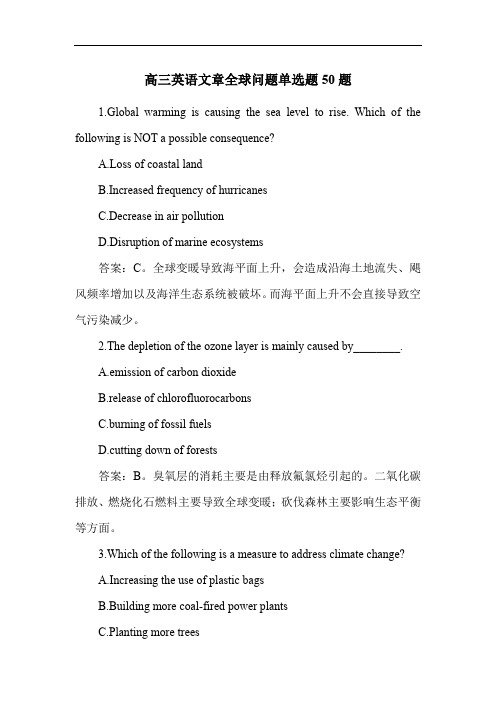
高三英语文章全球问题单选题50题1.Global warming is causing the sea level to rise. Which of the following is NOT a possible consequence?A.Loss of coastal landB.Increased frequency of hurricanesC.Decrease in air pollutionD.Disruption of marine ecosystems答案:C。
全球变暖导致海平面上升,会造成沿海土地流失、飓风频率增加以及海洋生态系统被破坏。
而海平面上升不会直接导致空气污染减少。
2.The depletion of the ozone layer is mainly caused by________.A.emission of carbon dioxideB.release of chlorofluorocarbonsC.burning of fossil fuelsD.cutting down of forests答案:B。
臭氧层的消耗主要是由释放氟氯烃引起的。
二氧化碳排放、燃烧化石燃料主要导致全球变暖;砍伐森林主要影响生态平衡等方面。
3.Which of the following is a measure to address climate change?A.Increasing the use of plastic bagsB.Building more coal-fired power plantsC.Planting more treesD.Dumping waste into the ocean答案:C。
种植更多的树可以吸收二氧化碳,有助于应对气候变化。
增加塑料袋使用、建设更多的燃煤发电厂、向海洋倾倒废物都会加剧环境问题。
4.Deforestation can lead to________.A.increased biodiversityB.more fertile soilC.flooding and soil erosionD.cooler climate答案:C。
全球化积极和消极影响英语作文

全球化积极和消极影响英语作文Globalization has had both positive and negative impacts on the world. On the positive side, globalization has brought about increased interconnectedness and interdependence among countries, leading to greater international cooperation and understanding. This has led to the spread of ideas, values, and technology, as well as increased trade and investment opportunities.One of the most significant positive impacts of globalization is economic growth. Globalization has opened up new markets and opportunities for businesses, leading to increased efficiency and productivity. This has resulted in higher living standards and the reduction of poverty in many parts of the world.Furthermore, globalization has also facilitated the exchange of knowledge and expertise across borders, leading to advancements in science, technology, and medicine. This has led to improved healthcare, communication, and transportation systems, benefiting people around the world.However, globalization has also brought about several negative impacts. One of the most significant is the widening gap between the rich and the poor. While globalization has led to economic growth in many parts of the world, it has also exacerbated income inequality, leading to social and political tensions.Additionally, globalization has led to the homogenization of cultures, as Western values and consumerism have spread to other parts of the world. This has led to the erosion of local traditions and customs, as well as the loss of cultural diversity.Moreover, globalization has also contributed to environmental degradation, as increased economic activity has led to greater resource consumption and pollution. This has led to environmental challenges such as climate change, deforestation, and the loss of biodiversity.In conclusion, while globalization has brought about many positive changes, it has also led to several negative impacts. It is important for policymakers and businesses to address these challenges and work towards a more inclusive and sustainable form of globalization.全球化对世界产生了积极和消极的影响。
全球化的好处英语作文
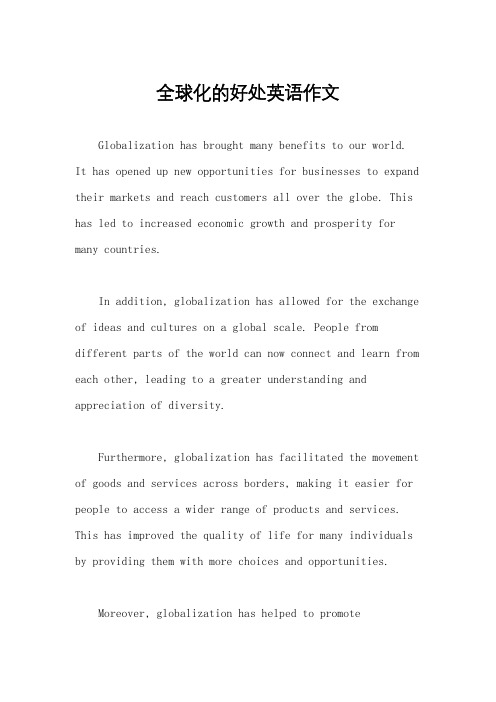
全球化的好处英语作文Globalization has brought many benefits to our world.It has opened up new opportunities for businesses to expand their markets and reach customers all over the globe. This has led to increased economic growth and prosperity for many countries.In addition, globalization has allowed for the exchange of ideas and cultures on a global scale. People from different parts of the world can now connect and learn from each other, leading to a greater understanding and appreciation of diversity.Furthermore, globalization has facilitated the movement of goods and services across borders, making it easier for people to access a wider range of products and services. This has improved the quality of life for many individuals by providing them with more choices and opportunities.Moreover, globalization has helped to promoteinnovation and technological advancements by enabling the sharing of knowledge and resources across borders. This has led to the development of new technologies and solutions that have improved the way we live and work.Overall, globalization has had a positive impact on our world by promoting economic growth, cultural exchange, access to goods and services, and technological advancements. It has connected us in ways that were once unimaginable and has the potential to continue to bring about positive change in the future.。
全球化的影响 英语作文
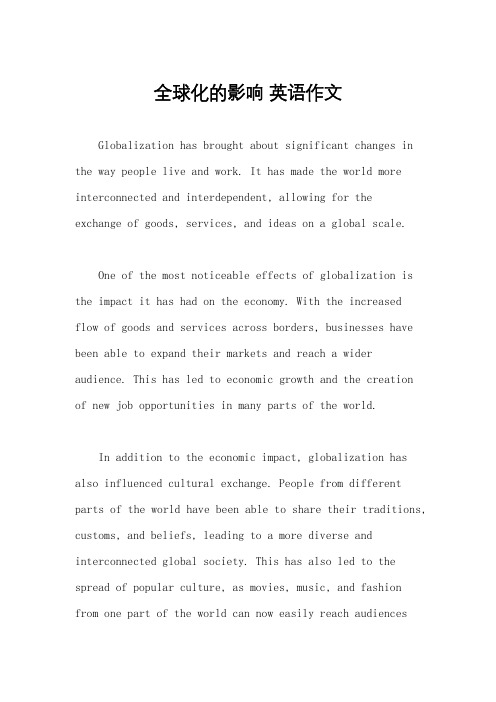
全球化的影响英语作文Globalization has brought about significant changes in the way people live and work. It has made the world more interconnected and interdependent, allowing for the exchange of goods, services, and ideas on a global scale.One of the most noticeable effects of globalization is the impact it has had on the economy. With the increasedflow of goods and services across borders, businesses have been able to expand their markets and reach a wider audience. This has led to economic growth and the creationof new job opportunities in many parts of the world.In addition to the economic impact, globalization has also influenced cultural exchange. People from different parts of the world have been able to share their traditions, customs, and beliefs, leading to a more diverse and interconnected global society. This has also led to the spread of popular culture, as movies, music, and fashion from one part of the world can now easily reach audiencesin other parts of the world.Furthermore, globalization has had an impact on the environment. The increased movement of goods and people has led to greater environmental challenges, such as pollution and the depletion of natural resources. However, it has also facilitated the sharing of knowledge and technology to address these challenges, leading to the development of more sustainable practices and solutions.Moreover, globalization has also affected politics and governance. It has led to the formation of international organizations and agreements, as well as the increased cooperation and coordination between countries. This has allowed for the addressing of global issues, such as climate change and terrorism, through collective efforts and shared resources.In conclusion, the impact of globalization is far-reaching and multifaceted, affecting various aspects of life, including the economy, culture, environment, and politics. While it has brought about many positive changes,it has also presented challenges that require collective and collaborative solutions.。
全球化的影响大学英语作文
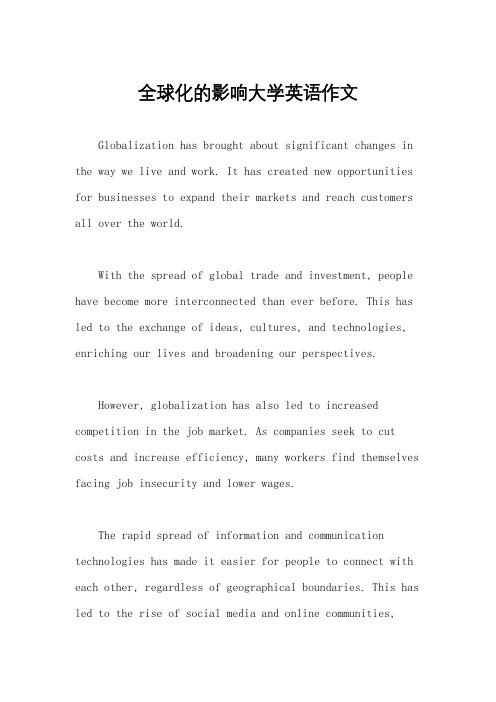
全球化的影响大学英语作文Globalization has brought about significant changes in the way we live and work. It has created new opportunities for businesses to expand their markets and reach customers all over the world.With the spread of global trade and investment, people have become more interconnected than ever before. This has led to the exchange of ideas, cultures, and technologies, enriching our lives and broadening our perspectives.However, globalization has also led to increased competition in the job market. As companies seek to cut costs and increase efficiency, many workers find themselves facing job insecurity and lower wages.The rapid spread of information and communication technologies has made it easier for people to connect with each other, regardless of geographical boundaries. This has led to the rise of social media and online communities,allowing people to share their experiences and learn from others around the world.On the other hand, globalization has also led to the homogenization of cultures, as Western values andlifestyles become more dominant in the global marketplace. This has raised concerns about the loss of culturaldiversity and the erosion of traditional ways of life.In conclusion, globalization has had both positive and negative effects on the world. While it has created new opportunities for economic growth and cultural exchange, it has also brought about challenges such as increased competition and the loss of cultural diversity. As we continue to navigate the complexities of a globalized world, it is important to consider the impact of our actions on both local and global communities.。
全球化-好处-英语作文
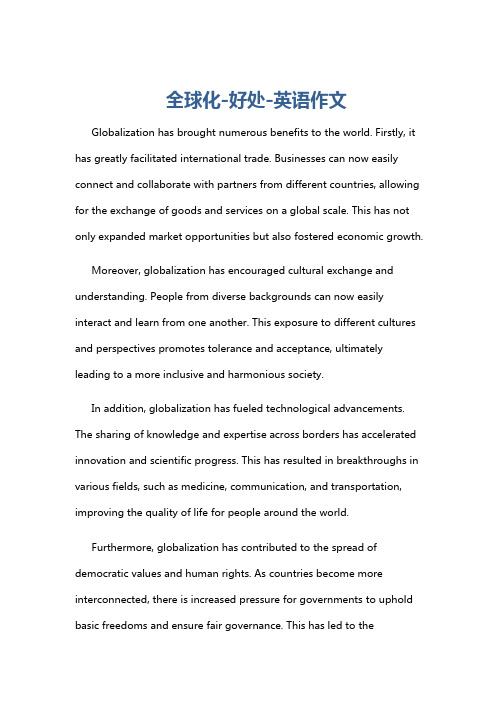
全球化-好处-英语作文Globalization has brought numerous benefits to the world. Firstly, it has greatly facilitated international trade. Businesses can now easily connect and collaborate with partners from different countries, allowing for the exchange of goods and services on a global scale. This has not only expanded market opportunities but also fostered economic growth.Moreover, globalization has encouraged cultural exchange and understanding. People from diverse backgrounds can now easily interact and learn from one another. This exposure to different cultures and perspectives promotes tolerance and acceptance, ultimately leading to a more inclusive and harmonious society.In addition, globalization has fueled technological advancements. The sharing of knowledge and expertise across borders has accelerated innovation and scientific progress. This has resulted in breakthroughs in various fields, such as medicine, communication, and transportation, improving the quality of life for people around the world.Furthermore, globalization has contributed to the spread of democratic values and human rights. As countries become more interconnected, there is increased pressure for governments to uphold basic freedoms and ensure fair governance. This has led to thepromotion of democracy and the protection of human rights in many parts of the world.Lastly, globalization has created opportunities for personal and professional growth. People can now easily travel and work in different countries, gaining valuable experiences and expanding their skill sets. This mobility has also allowed for the exchange of ideas and expertise, leading to the development of new solutions and approaches to global challenges.In conclusion, globalization has had a positive impact on the world. It has facilitated international trade, promoted cultural exchange, spurred technological advancements, advanced democratic values, and provided opportunities for personal and professional growth. Despite its challenges, globalization has undoubtedly brought about significant benefits that have shaped our interconnected world.。
英语作文全球化影响
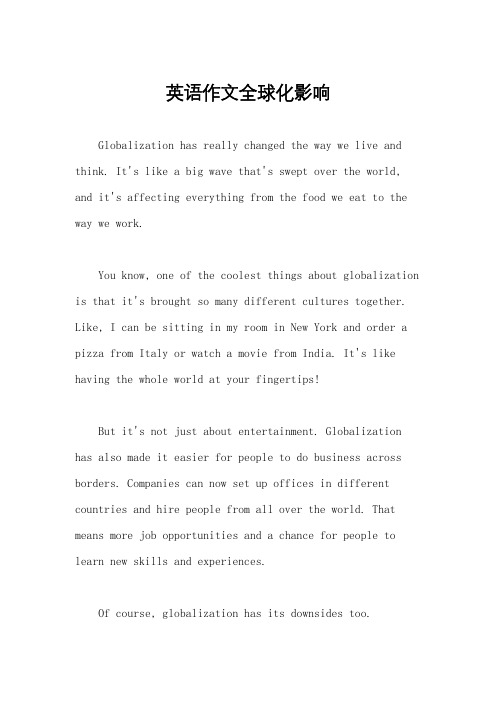
英语作文全球化影响Globalization has really changed the way we live and think. It's like a big wave that's swept over the world, and it's affecting everything from the food we eat to the way we work.You know, one of the coolest things about globalization is that it's brought so many different cultures together. Like, I can be sitting in my room in New York and order a pizza from Italy or watch a movie from India. It's like having the whole world at your fingertips!But it's not just about entertainment. Globalization has also made it easier for people to do business across borders. Companies can now set up offices in different countries and hire people from all over the world. That means more job opportunities and a chance for people to learn new skills and experiences.Of course, globalization has its downsides too.Sometimes it can lead to cultural homogenization, where everyone starts to look and act the same. And it can also make it harder for small businesses to compete with big global companies.But overall, I think globalization is a good thing.It's opened up so many new opportunities for people and has made the world a more interesting and connected place. Sure, there are challenges, but that's part of what makes life exciting, isn't it?。
全球化对发达国家的影响英语作文

Globalization's Impact on DevelopedCountriesIn the age of globalization, the world has become increasingly interconnected, with countries, cultures, and economies converging in a web of mutual influence and dependency. This trend has had profound effects on all nations, but particularly on developed countries, which have found themselves at the forefront of these changes. While globalization has brought numerous benefits to developed nations, it has also presented a series of challenges that require careful consideration and strategic responses.One of the most significant impacts of globalization on developed countries has been the growth of cross-border trade and investment. As tariffs and other barriers to trade have been gradually dismantled, companies in developed nations have had the opportunity to expand their markets and increase their profits by selling their products and services abroad. Similarly, foreign direct investment has flowed into developed countries, providing capital for innovation, expansion, and job creation. Thisinflux of trade and investment has contributed to economic growth and prosperity in developed nations.However, along with the opportunities, globalization has also brought challenges. One such challenge is the increased competition from emerging markets, which often have lower labor costs and more lenient environmental regulations. This competition has forced developed countries to become more innovative and efficient in order to maintain their competitive edge. At the same time, it has led to job losses in some sectors, as companies seek to reduce costs by relocating production to cheaper labor markets.Another challenge posed by globalization is the integration of diverse cultures and value systems. As people from different cultures migrate to developed countries, they bring their own customs, traditions, and beliefs, which can sometimes clash with the host country's values. This cultural diversity has the potential to create social tension and conflict, as well as to challenge the traditional values and institutions of developed nations.Despite these challenges, developed countries have much to gain from globalization. By embracing diversity and innovation, they can create more inclusive and resilient societies that are able to adapt to the changing global landscape. They can also take advantage of theopportunities presented by trade and investment to grow their economies and improve the well-being of their citizens.Globalization has also had a profound impact on the environment in developed countries. On the one hand, it has facilitated the development of cleaner and more efficient technologies that have helped to reduce pollution and environmental degradation. On the other hand, the increased consumption and production associated with globalization have also led to increased environmental pressure. Developed countries, therefore, need to take a proactive approach to environmental sustainability, balancing economic growth with environmental protection.In conclusion, globalization has had a mixed impact on developed countries. It has brought opportunities for growth and prosperity, but has also presented challenges interms of competition, cultural integration, and environmental sustainability. Developed countries must, therefore, carefully navigate these challenges while harnessing the opportunities presented by globalization to create more inclusive, resilient, and sustainable societies. **全球化对发达国家的影响**在全球化时代,世界日益相互关联,各国、文化和经济在相互影响和依赖的网络中汇聚。
八年级英语经济全球化影响单选题40题
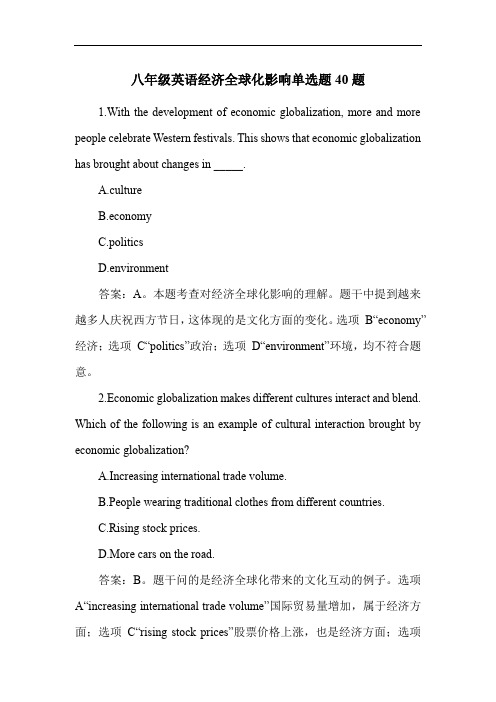
八年级英语经济全球化影响单选题40题1.With the development of economic globalization, more and more people celebrate Western festivals. This shows that economic globalization has brought about changes in _____.A.cultureB.economyC.politicsD.environment答案:A。
本题考查对经济全球化影响的理解。
题干中提到越来越多人庆祝西方节日,这体现的是文化方面的变化。
选项B“economy”经济;选项C“politics”政治;选项D“environment”环境,均不符合题意。
2.Economic globalization makes different cultures interact and blend. Which of the following is an example of cultural interaction brought by economic globalization?A.Increasing international trade volume.B.People wearing traditional clothes from different countries.C.Rising stock prices.D.More cars on the road.答案:B。
题干问的是经济全球化带来的文化互动的例子。
选项A“increasing international trade volume”国际贸易量增加,属于经济方面;选项C“rising stock prices”股票价格上涨,也是经济方面;选项D“more cars on the road”路上更多的车,与文化无关。
全球化对发达国家的影响英语作文

全球化对发达国家的影响英语作文Impact of Globalization on Developed CountriesGlobalization is the process of increased interconnectedness and interdependence among countries, economies, and people around the world. It has led to the expansion of international trade, the exchange of technology and ideas, and the movement of people across borders. While globalization has brought many benefits and opportunities to developed countries, it has also presented challenges and drawbacks that must be addressed.One of the main benefits of globalization for developed countries is increased economic growth and prosperity. Globalization has opened up new markets for goods and services, allowing businesses to expand their reach and increase their profits. This has led to higher living standards and increased access to a wider variety of goods and services for people in developed countries. Additionally, globalization has facilitated the transfer of technology and knowledge between countries, leading to advancements in science, medicine, and other fields.Globalization has also led to a more interconnected world, with people from different cultures and backgrounds interacting and sharing ideas. This has fostered greater cultural exchangeand understanding, helping to break down barriers and promote tolerance and cooperation among nations. Developed countries have benefited from this cultural exchange, gaining new perspectives and insights that have enriched their societies.However, globalization has also presented challenges for developed countries, particularly in terms of economic inequality and environmental degradation. As global trade and investment have increased, so too has the gap between the rich and the poor within developed countries. Some people have been left behind by globalization, facing job loss, wage stagnation, and economic insecurity. This has led to social unrest and political tensions in some developed countries, as people feel disillusioned with the promises of globalization.Furthermore, globalization has had negative impacts on the environment, as increased trade and economic activity have led to higher levels of pollution, deforestation, and resource depletion. Developed countries, with their high levels of consumption and industrialization, have been major contributors to these environmental problems. This has raised concerns about the sustainability of current economic practices and the need for more environmentally friendly and equitable forms of globalization.In response to these challenges, developed countries must work to ensure that the benefits of globalization are shared more equitably and sustainably. This may involve implementing policies to support workers who have been displaced by globalization, investing in education and training programs to help people adapt to changing job markets, and promoting sustainable practices in trade and industry. Developed countries must also work with other nations to address global challenges, such as climate change, poverty, and social inequality, which cannot be solved by any one country alone.Overall, globalization has had a profound impact on developed countries, bringing both opportunities and challenges. By recognizing and addressing these challenges, developed countries can harness the benefits of globalization while mitigating its negative impacts, creating a more prosperous and sustainable world for all.。
全球化是把双刃剑英语作文

Globalization: A Double-Edged SwordGlobalization, a complex and multifaceted phenomenon, has become a defining feature of the modern world. It represents the increasing interconnectedness and integration of nations, cultures, and economies, leading to the exchange of ideas, goods, and services across borders. However, like any powerful force, globalization is a double-edged sword, carrying both beneficial and potentially harmful consequences.On the one hand, globalization has brought remarkable advancements and opportunities. It has opened up new markets and avenues for trade, fostering economic growth and prosperity. Through the spread of technology and knowledge, globalization has enabled millions to access education, healthcare, and other vital services that were once inaccessible. This has lifted millions out of poverty and fostered a more equal distribution of resources and opportunities.Moreover, globalization has facilitated the exchange of cultural ideas and traditions, enriching our understanding of diverse worldviews and perspectives. It has broken down barriers, allowing people from different backgrounds to come together and share their experiences, creating a more inclusive and interconnected world.However, the flip side of globalization is also evident. The increasing interconnectedness of the world has led to the spread of challenges and problems that transcend national boundaries. Issues such as climate change, terrorism, and pandemics have become global concerns, requiring coordinated and collective efforts to address.Furthermore, globalization has often led to the marginalization of smaller and weaker economies, as larger and more powerful ones dominate global trade and markets. This has led to economic disparities and inequalities, with wealth and power becoming increasingly concentrated in a few hands.Moreover, the rapid spread of culture and values through globalization has sometimes led to the erosion of local cultures and traditions. As Western culture and consumerism become increasingly dominant, traditional ways of life and values are often threatened or lost.Additionally, the issue of globalization and its impact on jobs and labor markets is a complex one. While it has opened up new job opportunities in some sectors, it has also led to job displacement and uncertainty in others. The automation and digitization of many tasks have led to a decrease in demand for certain types of jobs, while the rise of the gig economy andremote work have created new challenges for workers and their families.In conclusion, globalization is indeed a double-edged sword. It has brought remarkable advancements and opportunities, but it has also created new challenges and disparities. The key lies in finding a balance, ensuring that the benefits of globalization are shared equitably and that its negative impacts are mitigated. This requires a concerted effort from governments, businesses, and individuals to work together and create a more inclusive, sustainable, and just globalized world.In this endeavor, it is crucial to recognize the interconnectedness of our world and the shared responsibility we all have in shaping its future. We must strive to ensure that globalization does not lead to the marginalization of vulnerable groups or the erosion of local cultures. Instead, we should aim to harness the positive aspects of globalization to create a world that is more prosperous, inclusive, and resilient.To achieve this, we need to invest in education and skills development to help individuals adapt to the changing job market. We must also promote policies that encourage sustainable development and reduce the negativeenvironmental impacts of globalization. Additionally, we should foster cultural exchange and dialogue to preserve the diversity of our world and promote mutual understanding and respect.In summary, globalization is a complex process that brings both opportunities and challenges. It is our responsibility to ensure that it serves the interests of all and creates a world that is more just, equitable, and sustainable. By working together and harnessing the power of globalization, we can build a better future for all.。
高三英语全球化趋势下的挑战单选题50题
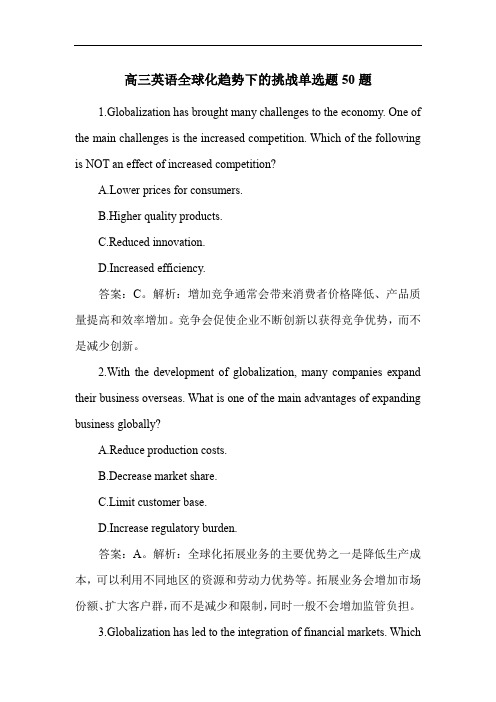
高三英语全球化趋势下的挑战单选题50题1.Globalization has brought many challenges to the economy. One of the main challenges is the increased competition. Which of the following is NOT an effect of increased competition?A.Lower prices for consumers.B.Higher quality products.C.Reduced innovation.D.Increased efficiency.答案:C。
解析:增加竞争通常会带来消费者价格降低、产品质量提高和效率增加。
竞争会促使企业不断创新以获得竞争优势,而不是减少创新。
2.With the development of globalization, many companies expand their business overseas. What is one of the main advantages of expanding business globally?A.Reduce production costs.B.Decrease market share.C.Limit customer base.D.Increase regulatory burden.答案:A。
解析:全球化拓展业务的主要优势之一是降低生产成本,可以利用不同地区的资源和劳动力优势等。
拓展业务会增加市场份额、扩大客户群,而不是减少和限制,同时一般不会增加监管负担。
3.Globalization has led to the integration of financial markets. Whichof the following is a potential risk of integrated financial markets?A.Stable exchange rates.B.Increased liquidity.C.Higher interest rates.D.Financial contagion.答案:D。
经济全球化带来的影响,英语作文
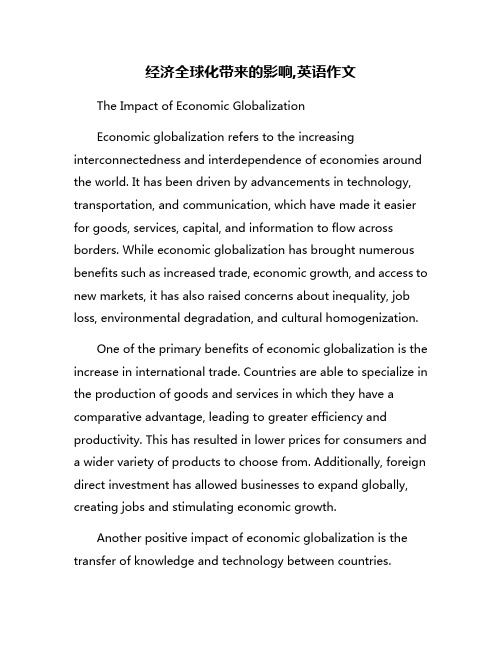
经济全球化带来的影响,英语作文The Impact of Economic GlobalizationEconomic globalization refers to the increasing interconnectedness and interdependence of economies around the world. It has been driven by advancements in technology, transportation, and communication, which have made it easier for goods, services, capital, and information to flow across borders. While economic globalization has brought numerous benefits such as increased trade, economic growth, and access to new markets, it has also raised concerns about inequality, job loss, environmental degradation, and cultural homogenization.One of the primary benefits of economic globalization is the increase in international trade. Countries are able to specialize in the production of goods and services in which they have a comparative advantage, leading to greater efficiency and productivity. This has resulted in lower prices for consumers and a wider variety of products to choose from. Additionally, foreign direct investment has allowed businesses to expand globally, creating jobs and stimulating economic growth.Another positive impact of economic globalization is the transfer of knowledge and technology between countries.Multinational corporations often bring new technologies and practices to developing countries, helping to improve productivity and living standards. This transfer of knowledge has also fueled innovation and entrepreneurship, leading to new industries and job opportunities.However, economic globalization has also led to some negative consequences. One of the biggest concerns is the widening gap between the rich and the poor. While globalization has lifted many people out of poverty, it has also exacerbated income inequality within and between countries. The benefits of globalization have not been evenly distributed, with wealth and power becoming increasingly concentrated in the hands of a few.Globalization has also been blamed for the loss of jobs in traditional industries, as companies move production to countries with lower labor costs. This has led to job displacement, wage stagnation, and increased competition for skilled jobs. In addition, globalization has put pressure on natural resources and the environment, as increased production and consumption have led to pollution, deforestation, and climate change.Culturally, economic globalization has led to the spread of Western values and consumer culture around the world. Whilethis has led to greater diversity and interconnectedness, it has also raised concerns about the homogenization of cultures and the erosion of local traditions. Some argue that globalization has led to a loss of cultural identity and has marginalized indigenous and minority groups.In conclusion, economic globalization has brought both benefits and challenges to the global economy. While it has increased trade, economic growth, and access to new markets, it has also raised concerns about inequality, job loss, environmental degradation, and cultural homogenization. Policymakers must address these challenges by promoting inclusive growth, sustainable development, and cultural diversity, in order to ensure that the benefits of globalization are shared by all.。
全球化利弊的英语作文
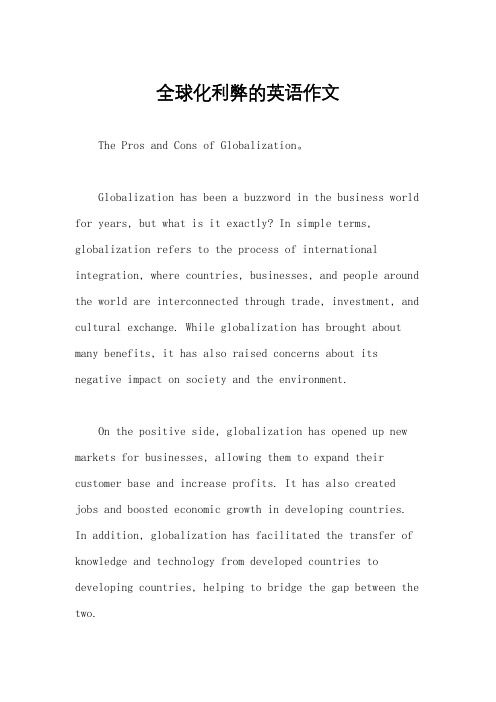
全球化利弊的英语作文The Pros and Cons of Globalization。
Globalization has been a buzzword in the business world for years, but what is it exactly? In simple terms, globalization refers to the process of international integration, where countries, businesses, and people around the world are interconnected through trade, investment, and cultural exchange. While globalization has brought about many benefits, it has also raised concerns about its negative impact on society and the environment.On the positive side, globalization has opened up new markets for businesses, allowing them to expand their customer base and increase profits. It has also created jobs and boosted economic growth in developing countries. In addition, globalization has facilitated the transfer of knowledge and technology from developed countries to developing countries, helping to bridge the gap between the two.However, globalization has also had some negative effects. One of the most significant concerns is the impact on the environment. The increased production and transportation of goods have led to higher levels of pollution and greenhouse gas emissions. In addition, globalization has led to the exploitation of natural resources, such as forests and water, in developing countries.Another concern is the impact on workers. While globalization has created jobs in developing countries, many of these jobs are low-paying and lack basic labor protections. This has led to a race to the bottom, where companies seek out the cheapest labor possible, often at the expense of workers' rights and safety.Finally, globalization has had a significant impact on culture and identity. As people around the world are exposed to different cultures and ideas, some worry that this could lead to the loss of unique cultural traditions and values.In conclusion, globalization has brought about many benefits, including increased economic growth and the transfer of knowledge and technology. However, it has also raised concerns about its impact on the environment, workers, and culture. As we continue to navigate the complexities of globalization, it is important to consider both the pros and cons and work towards creating a more sustainable and equitable global economy.。
全球化的双重性的英文作文

全球化的双重性的英文作文英文:Globalization, as a phenomenon, has both positive and negative aspects. On the one hand, it has connected people from different parts of the world, facilitated the exchange of ideas and cultures, and promoted economic growth. On the other hand, it has also led to the loss of traditional customs and values, and the exploitation of labor in developing countries.One of the positive aspects of globalization is theease of communication and information exchange. For example, I can easily communicate with my friends in China through social media platforms such as WeChat and Facebook. Thishas allowed me to stay connected with them and learn about their culture and traditions. Additionally, globalization has made it possible for me to travel to different parts of the world and experience diverse cultures and cuisines. I have had the opportunity to visit countries like Japan,Italy, and Brazil, and each experience has been enriching and eye-opening.However, globalization has also brought about negative consequences. For instance, the outsourcing ofmanufacturing jobs to developing countries has resulted in the exploitation of cheap labor. Many multinational corporations take advantage of the lower labor costs in countries like Bangladesh and Vietnam, leading to poor working conditions and low wages for workers. This exploitation not only harms the workers but alsoperpetuates a cycle of poverty in these countries.中文:全球化作为一种现象,既有积极的一面,也有消极的一面。
英语四级第三套作文模板
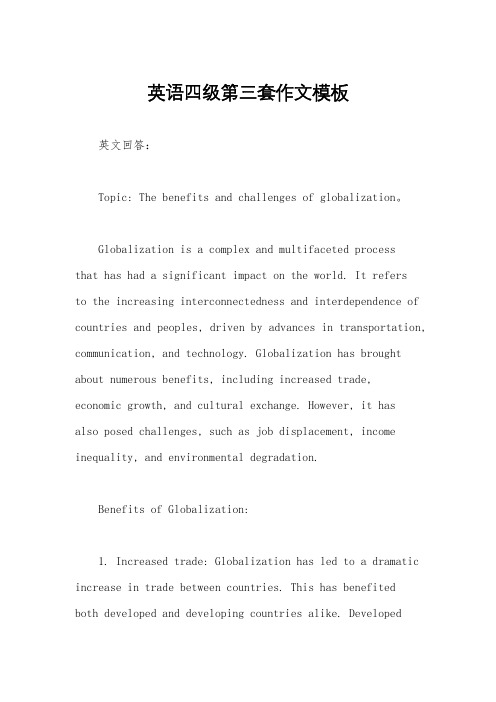
英语四级第三套作文模板英文回答:Topic: The benefits and challenges of globalization。
Globalization is a complex and multifaceted processthat has had a significant impact on the world. It refersto the increasing interconnectedness and interdependence of countries and peoples, driven by advances in transportation, communication, and technology. Globalization has brought about numerous benefits, including increased trade, economic growth, and cultural exchange. However, it hasalso posed challenges, such as job displacement, income inequality, and environmental degradation.Benefits of Globalization:1. Increased trade: Globalization has led to a dramatic increase in trade between countries. This has benefitedboth developed and developing countries alike. Developedcountries have gained access to cheaper goods and services, while developing countries have been able to export their products and services to a wider market.2. Economic growth: Globalization has also contributed to economic growth. By allowing countries to specialize in the production of goods and services that they have a comparative advantage in, globalization has led to increased efficiency and productivity. This has resulted in higher incomes and improved living standards for many people around the world.3. Cultural exchange: Globalization has alsofacilitated cultural exchange. As people from different countries interact with each other, they learn about each other's cultures and perspectives. This can lead to greater understanding and tolerance.Challenges of Globalization:1. Job displacement: One of the main challenges of globalization is job displacement. As companies move theiroperations to countries with lower labor costs, workers in developed countries may lose their jobs. This can lead to unemployment, wage stagnation, and increased inequality.2. Income inequality: Globalization has alsocontributed to income inequality. While some people have benefited from the increased trade and economic growth, others have been left behind. This is due to the fact that globalization has tended to favor skilled workers and those who can adapt to the changing economy, while low-skilled workers and those who are less adaptable have been morelikely to lose their jobs.3. Environmental degradation: Globalization has alsohad a negative impact on the environment. The increased trade and economic growth that has resulted from globalization has led to increased pollution, deforestation, and other environmental problems.Conclusion:Globalization is a complex and multifaceted processthat has had both benefits and challenges. While globalization has led to increased trade, economic growth, and cultural exchange, it has also posed challenges such as job displacement, income inequality, and environmental degradation. It is important to recognize both the benefits and challenges of globalization and to work to mitigate the challenges while maximizing the benefits.中文回答:全球化的利与弊。
雅思口语话范文

雅思口语话范文雅思口语考试是众多考生最为担心的一项考试,因为它不仅要求考生具备一定的英语语言能力,还需要考生具备流利、自然的口语表达能力。
因此,为了帮助考生更好地备考雅思口语考试,本文将为大家提供一些雅思口语话范文,希望能够对大家的备考有所帮助。
Part 1Part 1 是雅思口语考试中的第一部分,主要是考察考生的个人信息、兴趣爱好、家庭、工作等方面的话题。
下面是一些常见的 Part 1 话题及范文:1. What is your full name?My name is Lily. I was named after a beautiful flower by my parents.2. Where are you from?I am from Beijing, the capital city of China. It is a vibrant and bustling city with a rich cultural heritage.3. Do you work or study?I am currently a student at a local university. I am majoring in English literature and hope to become a teacher in the future.4. What do you like to do in your free time?In my free time, I enjoy reading books, watching movies, and listening to music. I also like to travel and explore new places.5. Do you have any siblings?Yes, I have a younger brother. He is currently studying in high school and is very interested in science and technology.Part 2Part 2 是雅思口语考试中的第二部分,主要是考察考生的口语表达能力。
全球化 好处 英语作文
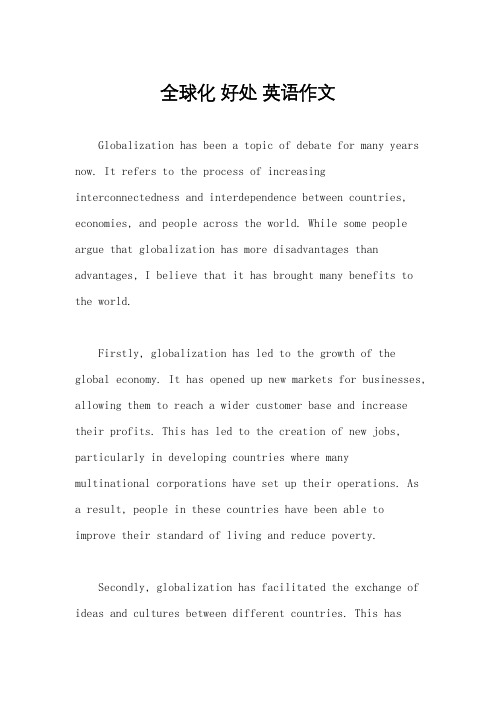
全球化好处英语作文Globalization has been a topic of debate for many years now. It refers to the process of increasing interconnectedness and interdependence between countries, economies, and people across the world. While some people argue that globalization has more disadvantages than advantages, I believe that it has brought many benefits to the world.Firstly, globalization has led to the growth of the global economy. It has opened up new markets for businesses, allowing them to reach a wider customer base and increase their profits. This has led to the creation of new jobs, particularly in developing countries where manymultinational corporations have set up their operations. As a result, people in these countries have been able to improve their standard of living and reduce poverty.Secondly, globalization has facilitated the exchange of ideas and cultures between different countries. This hasled to the spread of knowledge and innovations across the world. For instance, advancements in technology and medicine have been shared across borders, leading to improved healthcare and a better quality of life for people in many parts of the world.Thirdly, globalization has helped to promote peace and stability in the world. By increasing economic interdependence between countries, it has made it less likely for them to engage in conflicts and wars. This is because countries that rely on each other for trade and investment are less likely to engage in actions that could harm their economic interests.Finally, globalization has helped to promote environmental sustainability. This is because many global environmental issues, such as climate change, require a collective effort from all countries to address. Globalization has made it easier for countries to work together to tackle these issues by providing a platform for international cooperation and coordination.In conclusion, while globalization may have its drawbacks, such as the widening income gap between rich and poor countries, I believe that its benefits outweigh its disadvantages. It has led to the growth of the global economy, facilitated the exchange of ideas and cultures, promoted peace and stability, and helped to promote environmental sustainability. Therefore, it is importantfor countries to continue to work together to promote globalization and ensure that its benefits are shared by all.。
The Pros and Cons of Globalization
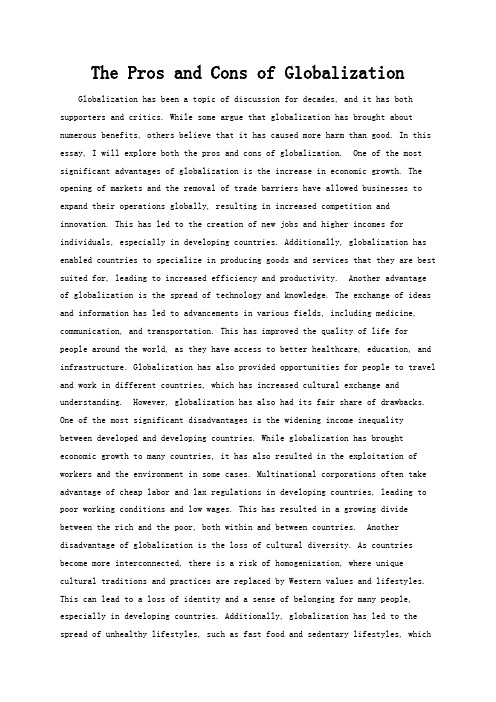
The Pros and Cons of Globalization Globalization has been a topic of discussion for decades, and it has both supporters and critics. While some argue that globalization has brought about numerous benefits, others believe that it has caused more harm than good. In this essay, I will explore both the pros and cons of globalization. One of the most significant advantages of globalization is the increase in economic growth. The opening of markets and the removal of trade barriers have allowed businesses to expand their operations globally, resulting in increased competition and innovation. This has led to the creation of new jobs and higher incomes for individuals, especially in developing countries. Additionally, globalization has enabled countries to specialize in producing goods and services that they are best suited for, leading to increased efficiency and productivity. Another advantage of globalization is the spread of technology and knowledge. The exchange of ideas and information has led to advancements in various fields, including medicine, communication, and transportation. This has improved the quality of life for people around the world, as they have access to better healthcare, education, and infrastructure. Globalization has also provided opportunities for people to travel and work in different countries, which has increased cultural exchange and understanding. However, globalization has also had its fair share of drawbacks. One of the most significant disadvantages is the widening income inequality between developed and developing countries. While globalization has brought economic growth to many countries, it has also resulted in the exploitation of workers and the environment in some cases. Multinational corporations often take advantage of cheap labor and lax regulations in developing countries, leading to poor working conditions and low wages. This has resulted in a growing divide between the rich and the poor, both within and between countries. Another disadvantage of globalization is the loss of cultural diversity. As countries become more interconnected, there is a risk of homogenization, where unique cultural traditions and practices are replaced by Western values and lifestyles. This can lead to a loss of identity and a sense of belonging for many people, especially in developing countries. Additionally, globalization has led to the spread of unhealthy lifestyles, such as fast food and sedentary lifestyles, whichcan have negative impacts on people's health. In conclusion, globalization has both pros and cons, and its effects are complex and multifaceted. While it has brought about economic growth and technological advancements, it has also led to income inequality and the loss of cultural diversity. It is essential to recognize these challenges and work towards addressing them while harnessing the benefits of globalization. By promoting fair trade practices, protecting workers' rights, and preserving cultural heritage, we can ensure that globalization benefits everyone, not just a select few.。
- 1、下载文档前请自行甄别文档内容的完整性,平台不提供额外的编辑、内容补充、找答案等附加服务。
- 2、"仅部分预览"的文档,不可在线预览部分如存在完整性等问题,可反馈申请退款(可完整预览的文档不适用该条件!)。
- 3、如文档侵犯您的权益,请联系客服反馈,我们会尽快为您处理(人工客服工作时间:9:00-18:30)。
Title: Globalisation has brought many positive charges worldwide. However, it has also created problems (third dtaft)Name: Susan YU LUIn recent decades, it is a well-known fact that earth is just like a small village as a result of globalisation. This situation has brought various changes worldwide to the economy, industry and culture of most places. Although some these changes are negative for some individuals and some countries, it seems obvious that others are mainly positive. This essay will discuss the benefits and drawbacks of globalisation.First of all, there are many advantages of globalisation in the aspects of economy. With the increase in international trade, the economy has risen enormously for many countries and therefore the average income has explosive growth for numerous people. This circumstance comes to their assistance to improve the standard of living for many people and reduced levels of poverty in some countries. For example, compared the average income which was too underpaid to support a family, about 200 yuan in thirty years ago, currently it is expanded to approximately 4,000 yuan, which enables Chinese to buy a number of commodities and boost their confidence in the Chinese economy. On the other hand, some developed countries, such as America and Japan, have been enriched due to the widespread development of globalisation around the world. Because globalisation can increase numerous free trades among rich countries and cooperation among international companies most in developed countries. This leads to the advancement of financial fields, moreover may make rich countries prosper. Hence, globalisation can affect many people and countries positively in economic aspect.However, not everyone and every country has benefited from globalization on economic front, especially the poor and developing countries. It is a fact that a number of poor persons can only have a slight improvement in income, perhaps even not enough to account for the rise of prices. In addition, it is true that several poor countries, which have developed international trade, may not have opportunities to become wealthier, as most prices of the goods of exports and imports have been dominated by rich ones in order to make them prosperous. Although there are clearly some disadvantages of globalisation for these developing countries, it is widely believed that overall globalisation has had mainly positive effects.The industrial development is another main aspect of globalisation. It is likely that some countries are encouraged by globalisation to contribute to one or two main industries which are successful. Therefore, these counties tend to neglect other local industries which should be dependence on imports. This phenomenon might lead imbalance to large debts which are very difficult to repay. Besides, sometimes it is true that it may be many hardships for developing country to find the international markets if their local commodities are in low quality, compared to developedcountries. This is as a result of their lack of advanced technologies and experts. In spite of these drawbacks, there are more significant positive impacts having been brought. It seems clear that poor countries can learn superior manufacturing techniques and develop expertise from rich countries to enhance levels of industry. At the same time, a great many counties may have a larger market and can increase exports if the commodities are produced in high quality. Thus, learning high technologies by globalisation could aid developing countries to establish well-developed industry.Finally, the cultural and languages’ effects have been brought by globalisation. One of such effects is that different cultures and languages, which have been integrated throughout the process of globalization, have a tendency to learn from each other in order to improve them, because globalisation may encourage people to contact by a common language and background. However, declining the cultural diversity is caused by such circumstance, which means that some unique local cultures and languages used by a few persons are likely to disappear. Hence, the diversity of culture can be diminished by an international culture.To sum up, globalization has had widespread development in recent decades and affected in various aspects. Although it is possible that more the rich and developed countries can benefit from globalization than the poor and developing countries, it has improved the lives of many individuals and enabled some poorer countries to prosper.。
